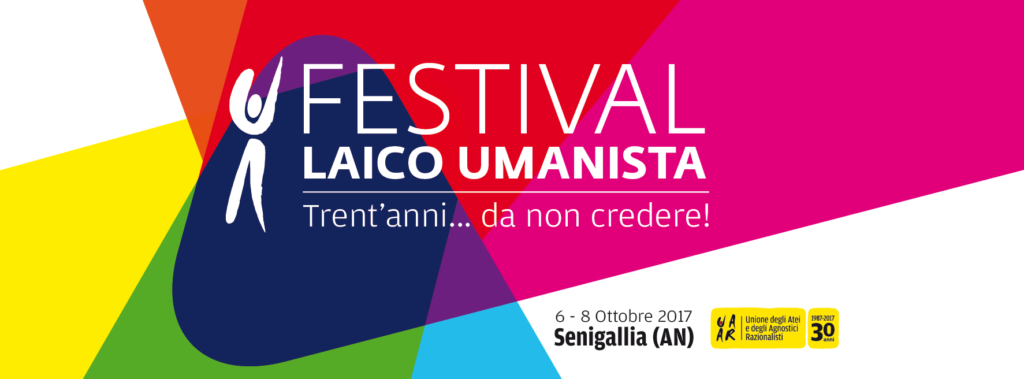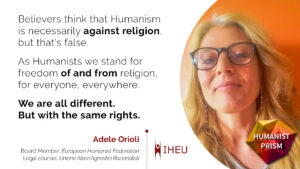Clicca qui per leggere l’articolo in italiano

 The Italian Union of Rationalist Atheists and Agnostics (UAAR) celebrated its 30th birthday last week with the very first “humanist” festival ever held in Italy.
The Italian Union of Rationalist Atheists and Agnostics (UAAR) celebrated its 30th birthday last week with the very first “humanist” festival ever held in Italy.
It is a landmark step in a country where the word and the concept of modern “humanism” has gained much currency in the recent years. There were three days of of thematic panels, workshops, concerts and much more in the first ever “Secular Humanist Festival” organised by UAAR (an IHEU Member Organization) in Senigallia to celebrate its 30th birthday.

Stefano Incani, UAAR Secretary General
Looking back at the history of UAAR, its Secretary General, Stefano Incani, made the following assessment:
“During these 30 years our pluralist, secular, and humanist organization has actually affected the life of this country, despite the hostility of politics, the aggressiveness of part of the ecclesiastic world, and the indifference of media.
These have actually been “30 years beyond belief”, to recall the slogan we chose for our festival held in the marvellous Piazza del Duca in Senigallia. These years are “beyond belief” because it was hard, back in 1987, to imagine that today we would have been here all together celebrating our organization, which keeps on fighting to propose an alternative idea of political engagement and civil progress.
UAAR has always been far from institutional politics, and that cost us a lot. But UAAR pursued such independence as an essential and irrevocable freedom. But at the same time, we struggled so hard to acquire resources and visibility.
Today we have both things, because people rewarded us. With this secular humanist festival we wanted to thank each of this persons – their efforts, their work, their personal commitment.”
For such a special occurrence the organisers developed an amazing three-day program, from which can be read many of the challenges that UAAR is addressing today: the struggle for a secular and inclusive education; the campaign to ensure freedom of choice on living wills, legal assisted dying, and sexual and reproductive rights; the fight against gender and religious discrimination, and more besides.

Adele Orioli in her entry for the Humanist Prism series
Commenting the success of the festival, Adele Orioli, UAAR legal counsel and member of the Coordination Committee, said:
“The first goal of the festival has been to inform people on the daily discrimination of non-believers in Italy, from their birth to their death. We have done it on different communicative levels, including some funny ways like quiz with prizes, magic shows, labs of philosophy for children, etc.
The thematic stands of the festival followed the life stages of an Italian non-believer – from the “sbattezzo” (literally the act of “de-baptising”) to the individual living will, passing from the reproductive rights, the costs of the Church for the State, and many other themes.
But the festival has been above all the occasion to show what our association can do and propose: humanist celebrations, the map of pharmacies who illegally refuse to sell contraceptive pills, moral secular assistance in hospitals, and the campaign on “sbattezzo” itself – many visitors have done it during the festival, not as a vengeance rite, bur rather as the exercise of a fundamental human right, that is, freedom of religion and belief.”
Photos, videos, and reports from the festival are being published on UAAR Facebook page which is at the moment the main point of reference for the secular and rationalist community in Italy.

Giovanni Gaetani, IHEU Growth and Development Officer
Giovanni Gaetani, IHEU Growth and Development Officer and a volunteer for the UAAR youth section, commented the success of the festival:
“The work of UAAR is inestimable. All campaigns it led during these 30 years – and the campaigns it is still leading today – are quietly but significantly changing many aspects of the Italian society.
Today non-believers in Italy can finally leave the Catholic Church simply by filling in a form. Atheists and agnostics are starting to celebrate marriages and funerals in a secular way with the help of trained humanist celebrants. Students in school can opt-out from the teaching of the Catholic religion and choose an alternative secular class.
Maybe few people realise it, but all these and other achievements are merits of UAAR – of its campaigns carried forward by a group of volunteers who believe that things in Italy can actually change for better.
Another achievement of UAAR is contributing to the spreading of the humanist worldview. Thanks to UAAR people in Italy are becoming more familiar with the word and the concept of “humanism” in its modern usage, which just five or ten years was practically unknown or conflated with the the renaissance humanist movement.
In many ways Italy remains deeply institutionally Catholic, which poses many challenges to the progress of humanist values. But I am confident that in the long-run we will succeed.”
Follow us on Facebook or sign up for our monthly newsletter
“30 anni… da non credere!” L’UAAR celebra il primo festival umanista mai tenuto in Italia
 L’Unione degli Atei e degli Agnostici Razionalisti (UAAR) ha celebrato la scorsa settimana il suo trentesimo compleanno durante il primo festival umanista mai tenutosi in Italia.
L’Unione degli Atei e degli Agnostici Razionalisti (UAAR) ha celebrato la scorsa settimana il suo trentesimo compleanno durante il primo festival umanista mai tenutosi in Italia.
Si tratta di un passo estremamente significativo in un paese dove il termine e il concetto stesso di moderno “umanismo” ha guadagnato sempre più spazio negli ultimi anni. Tre giorni di conferenze, laboratori, concerti e molto altro ancora: questo è stato il primo “Festival Laico-Umanista” organizzato a Senigallia dall’UAAR – organizzazione membra della IHEU.

Stefano Incani, UAAR Secretary General
Ripercorrendo la storia dell’UAAR, il suo segretario, Stefano Incani, ha fatto il seguente bilancio:
“In questi trent’anni, a dispetto delle ostilità della politica, dell’aggressività di certo mondo ecclesiastico, dell’indifferenza dei media, un’Associazione laica, umanista e plurale come la nostra ha potuto incidere nella vita di questo Paese.
Sono stati “trent’anni da non credere”, come recitava lo slogan riportato sui manifesti e sugli striscioni che hanno campeggiato per tre giorni nella splendida Piazza del Duca di Senigallia. Perché non era certo facile, trent’anni fa, immaginare che oggi avremmo festeggiato il nostro essere ancora qui – a combattere, a proporre una diversa idea di azione politica e di progresso civile.
L’UAAR è sempre stata lontana dalla politica istituzionale, e questo ci è costato molto. Ma l’UAAR ha accettato questa condizione come una tra le più necessarie, come una libertà indispensabile. Ciò ha comportato anche una maggiore fatica nell’acquisizione di visibilità e di risorse.
Oggi abbiamo entrambe le cose, perché le persone ci hanno premiato. Questo Festival Laico-Umanista è stata l’occasione per ringraziare ognuna di queste persone per il loro sforzo, il loro lavoro, il loro impegno personale.”
Per un’occasione così speciale gli organizzatori hanno messo in piedi uno splendido programma di tre giorni dal quale emergono chiaramente le sfide che l’UAAR sta portando avanti oggi: la battaglia per un’educazione laica ed inclusiva; le campagne sulla libertà di scelta in tema di testamento biologico, fine-vita, diritti riproduttivi e libertà sessuale; la lotta contro la discriminazione religiosa e di genere, e molto altro ancora.

Adele Orioli in her entry for the Humanist Prism series
Commentando il successo del festival, Adele Orioli, Responsabile Iniziative Legali e membro del Comitato di Coordinamento dell’UAAR, ha detto:
“Il Festival ha permesso innanzitutto di fare informazione su quanto i non credenti in Italia subiscano discriminazioni quotidiane e nell’arco di tutta la loro esistenza, dalla nascita alla morte. Lo abbiamo fatto usando diversi registri comunicativi, inclusi quelli più divertenti – quiz a premi, spettacoli di magia, laboratori di filosofia per bambini, etc.
Nei box tematici, suddivisi proprio seguendo le fasi della vita, si parlava di sbattezzo, di costi della chiesa, di diritti riproduttivi, di testamento biologico e molto altro.
Ma anche, se non soprattutto, il Festival è stato l’occasione per mostrare quanto possa fare e proporre un’associazione come la nostra. Dalle cerimonie laiche alla mappatura delle farmacie obiettrici contra legem, dall’assistenza morale non confessionale allo stesso sbattezzo, alla cui procedura hanno aderito molti visitatori. Non un contro-rito vendicativo, ma l’esercizio di un diritto umano fondamentale: quello di libertà religiosa.”
Foto, video e resoconti dal festival sono in fase di pubblicazione sulla pagina Facebook dell’UAAR, ad oggi uno dei punti di riferimento per la comunità laica e razionalista in Italia.

Giovanni Gaetani, IHEU Growth and Development Officer
Giovanni Gaetani, Responsabile Crescita e Sviluppo della IHEU e volontario dell’UAAR Giovani, ha commentato così il successo del festival:
“Il lavoro dell’UAAR è inestimabile. Tutte le campagna condotte in questi 30 anni, così come le campagne che sta portando avanti oggi, hanno silenziosamente ma significativamente cambiato molti aspetti della società italiana.
Oggi i non-credenti in Italia possono abbandonare facilmente la Chiesa Cattolica compilando un semplice modulo. Atei e agnostici possono celebrare matrimoni e funerali laici grazie all’aiuto di celebranti umanisti qualificati. Nelle scuole gli studenti possono rinunciare all’insegnamento della religione cattolica e scegliere un’alternativa laica.
Forse in poco lo sanno, ma questi ed altri traguardi raggiunti sono merito dell’UAAR – delle sue campagne portate avanti da un gruppo di volontari i quali credono che le cose in Italia possano davvero cambiare in meglio.
Un altro obiettivo al quale l’UAAR sta contribuendo è la diffusione della visione del mondo umanista. Grazie all’UAAR le persone in Italia stanno diventando sempre più consapevoli del significato della parola e del concetto di “umanismo” nel suo uso moderno, laddove fino a cinque, dieci anni fa questo termine era praticamente sconosciuto o, peggio, confuso con il movimento rinascimentale dell’Umanesimo.
Certo, l’Italia rimane sotto molti fronti un paese profondamente cattolico, specialmente a livello istituzionale. Questo non fa che rendere più difficile il progresso dei valori umanisti. Eppure sono sicuro che nel lungo periodo riusciremo a farcela.”